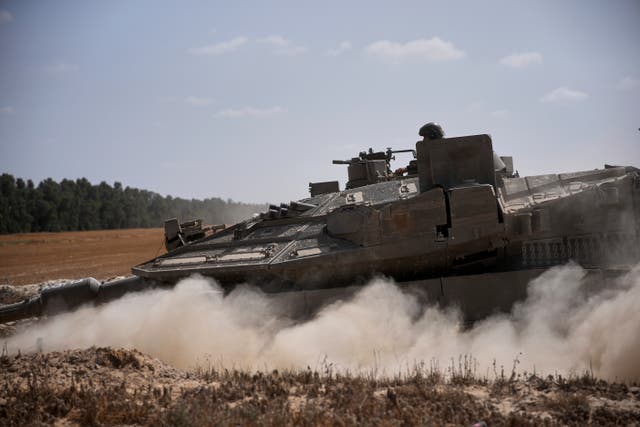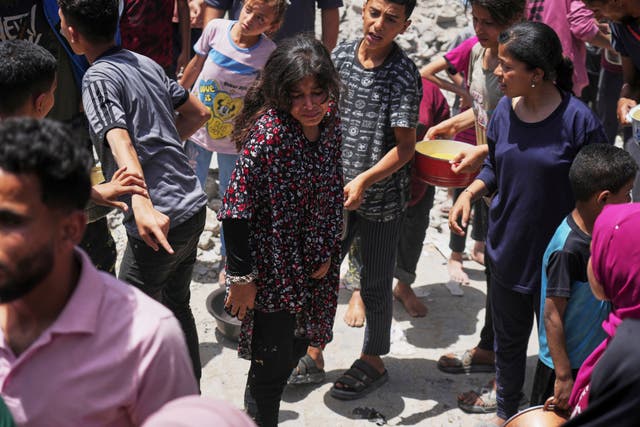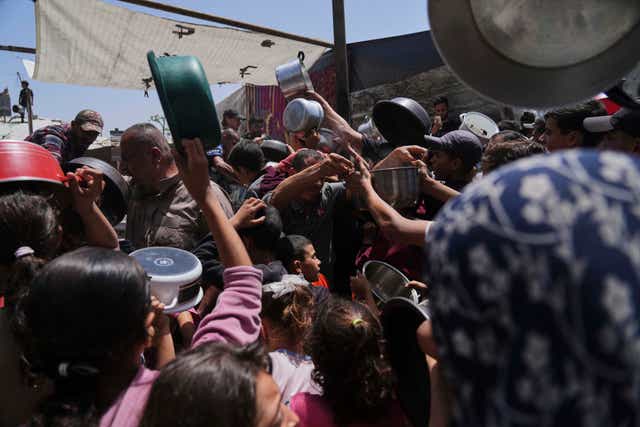Netanyahu says he will allow some aid into Gaza as offensive continues
The Israeli PM acknowledged that his decision came after pressure from allies.

Israeli Prime Minister Benjamin Netanyahu has said his decision to resume limited aid to the Gaza Strip came after pressure from allies who said they could not support Israel’s renewed offensive if “images of hunger” come out of the Palestinian territory.
The announcement raised hope among Palestinians that desperately needed food, medicine and other supplies would enter – but none had appeared by Monday afternoon.
An Israeli official said a shipment of flour, baby food and medical supplies would be allowed into Gaza.
Eden Bar Tal, the Foreign Ministry’s director general, said the baby food had started entering, but there was no sign of any aid on the Gaza side of the border. He did not say how much aid would enter, where it would enter or when.
Israel has meanwhile launched a new wave of air and ground operations across the territory, and the army ordered the evacuation of Gaza’s second-largest city, Khan Younis, where Israel carried out a massive operation earlier in the war that left much of the area in ruins.
On Sunday, Israel said it would allow a “basic” amount of aid into Gaza to prevent a “hunger crisis” from developing.
Experts have already warned of potential famine if the blockade imposed on the territory’s roughly two million Palestinians is not lifted.
Israel has stepped up its offensive in Gaza in what it says is a bid to pressure Hamas to release the remaining hostages abducted in attack on October 7 2023 that ignited the war.
Hamas has said it will only release them in exchange for a lasting ceasefire and an Israeli pullout.
Mr Netanyahu said that Israel plans on “taking control of all of Gaza”, and establishing a new system to distribute aid that circumvents Hamas. He has also said Israel will encourage what he refers to as the voluntary emigration of much of Gaza’s population to other countries.
The Trump administration has voiced full support for Israel’s actions and blames Hamas for the toll on Palestinians, though in recent days it has expressed growing concern over the hunger crisis.

US President Donald Trump – who did not land in Israel on his trip to the region last week – voiced concern about the humanitarian situation in Gaza, as did secretary of state Marco Rubio, who said on a visit to Turkey that he was “troubled” by it.
In a video statement posted to social media, Mr Netanyahu said Israel’s “greatest friends in the world” had told him: “We cannot accept images of hunger, mass hunger. We cannot stand that. We will not be able to support you.”
Mr Netanyahu mentioned “senators”, without giving their nationality.
He also said the situation was approaching a “red line” and a “dangerous point”, but it was not clear if he was referring to the crisis in Gaza or the potential loss of support from allies.

The video statement appeared aimed at pacifying anger from Mr Netanyahu’s nationalist base at the decision to resume aid. Two far-right governing partners have pressed Mr Netanyahu not to allow aid into Gaza.
At least one of them, finance minister Bezalel Smotrich, appeared to be on board with the latest plan.
“No more raids and going in and out, but conquering, cleansing and remaining until Hamas is destroyed,” he said.
“We are destroying what is still left of the Strip, simply because everything there is one big city of terror.”

The aid that would be let in would be “minimal”, Mr Netanyahu said, without specifying precisely when it would resume, and would act as bridge toward the launch of a new aid system in Gaza, in which a US-backed organisation will distribute assistance in hubs that will be secured by the Israeli military.
Israel says the plan is meant to prevent Hamas from accessing aid, which Israel says it uses to bolster its rule in Gaza.
UN agencies and aid groups have rejected the plan, saying it will not reach enough people and would weaponise aid in contravention of humanitarian principles. They have refused to take part in it.
A UN official said a shipment of 20 aid trucks carrying mostly food is expected to enter on Monday.
Israeli authorities have not commented on when the aid would begin entering.
Meanwhile, Khan Younis residents said Israeli special forces disguised as displaced Palestinians launched a rare ground raid into the city.
The forces killed Ahmed Sarhan, a leader in the armed wing of the Popular Resistance Committees, in a shootout, the group said. Palestinian witnesses said his wife and daughter were detained.
The forces drove in on a civilian vehicle and carried out the raid under cover from heavy air strikes. At least five other people were killed, in addition to Sarhan, according to Nasser Hospital.
Also on Monday, an Israeli strike on a school-turned-shelter in the built-up Nuseirat refugee camp killed five people, including a woman and a girl, and wounded 18, mostly children, according to Al-Awda Hospital, which received the casualties.





